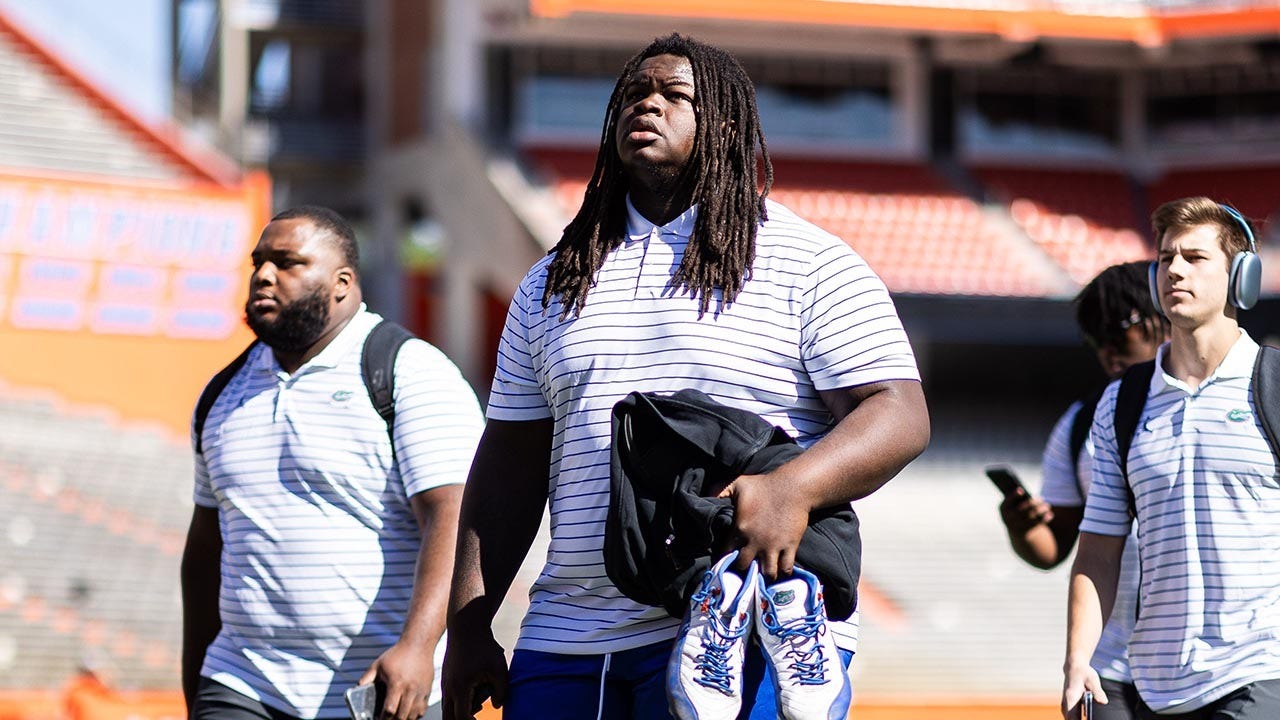Desmond Watson, the University of Florida defensive lineman known for his massive size, has been one of the most talked-about names in football, not only for his playing ability but also for his weight loss transformation. At his 2025 Pro Day, Watson weighed in at 464 pounds, making him the heaviest player in the NFL at the time. Over the past year, he has been on a highly publicized weight loss journey, reportedly shedding more than 100 pounds. His story is both inspiring and complex, showing the immense challenges athletes face when balancing health, performance, and public expectations.
The Weight Struggle and Turning Point
For much of his college career, Desmond Watson’s size made him a unique presence on the field. His sheer power and strength as a defensive lineman often gave him an advantage, but his weight also became a growing concern for his health and professional prospects. NFL teams made it clear that if he wanted a long career, he would need to reduce his weight and improve his conditioning.
This pressure, combined with his own health concerns, motivated Watson to begin a serious weight loss plan. The goal was not only to meet the expectations of professional teams but also to ensure that he could perform at a high level without risking long-term health issues.
Nutrition Overhaul and Lifestyle Changes
A major part of Watson’s transformation came from changes to his diet. Working closely with a nutritionist, he eliminated processed foods, reduced sugar and starches, and focused on a diet rich in lean proteins, vegetables, and whole grains. Portion control also became an important part of his daily routine, helping him avoid overeating.
Watson admitted that emotional eating had been a challenge in the past, but he worked to address those habits with healthier alternatives. Interestingly, one of his staple meals during his weight loss journey was the Spicy Southwest Salad from Chick-fil-A, which allowed him to enjoy satisfying meals while staying on track with his nutrition goals.
Exercise and Fitness Routine
Watson’s physical transformation was also driven by a structured exercise program. He began with low-impact workouts like walking, which were easier on his joints given his size. Over time, he incorporated resistance training to maintain muscle mass while shedding fat.
As his stamina improved, Watson added more rigorous training sessions, including mobility drills, cardio, and football-specific exercises. These sessions were designed to build endurance, agility, and explosive strength—all critical skills for a defensive lineman hoping to thrive at the professional level.
Conflicting Reports About Weight Loss Numbers
One of the complexities in Watson’s journey has been conflicting reports about his actual weight loss. Earlier in 2025, some sources reported that he had lost over 100 pounds, dropping from 464 pounds down to around 350–360 pounds. However, other reports closer to his release from the Tampa Bay Buccaneers suggested that he had gone from 464 pounds to approximately 449–450 pounds.
This discrepancy highlights both the difficulty of tracking weight fluctuations in athletes and the intense scrutiny placed on Watson during his transformation. Regardless of the exact number, his effort to lose weight in such a short time was remarkable, even if the results did not fully align with team expectations.
Release From the Buccaneers
On August 25, 2025, the Tampa Bay Buccaneers announced that they had released Desmond Watson after he failed to meet their weight and conditioning requirements. Despite dropping nearly 30 pounds since training camp began in late July, Watson was not cleared to practice with the team.
This decision marked a setback in his professional journey. For Watson, it was a reminder that the road to lasting transformation is rarely smooth, especially under the spotlight of the NFL. His release does not necessarily end his football career, but it does emphasize the importance of consistency and the difficulty of meeting the physical standards required at the highest level of competition.
The Mental and Emotional Challenge
Watson’s journey also underscores the psychological toll of weight loss in professional sports. Athletes often face extreme pressure not just to perform but to conform to specific body standards. For someone of Watson’s size, the demands were particularly intense, and his progress was constantly measured against public expectations.
By addressing emotional eating and working on healthier lifestyle habits, Watson took steps toward long-term sustainability. However, the ongoing pressure from teams and the media made his journey even more demanding, adding an emotional layer to the physical challenge.
Lessons From His Transformation
Desmond Watson’s weight loss journey provides valuable lessons beyond the football field. His story shows the importance of a holistic approach to health that includes nutrition, exercise, mental wellness, and a support system. Quick fixes are rarely sustainable, and real transformation requires time, patience, and consistent effort.
For fans and aspiring athletes, Watson’s story is a reminder that even elite players face struggles with health and fitness. His journey demonstrates resilience, even in the face of setbacks, and highlights the reality that personal health is often more important than external expectations.
Conclusion
Desmond Watson’s story is still unfolding. From his days as one of college football’s most recognizable linemen to his efforts to reshape his body for the NFL, he has shown determination and discipline. While his release from the Tampa Bay Buccaneers was a setback, it does not diminish the progress he has made in improving his health and lifestyle.
With continued dedication, support, and refinement of his training and nutrition, Watson still has the opportunity to shape his future in football or beyond. More importantly, his journey highlights the challenges of significant weight loss and the courage it takes to pursue such a transformation under the public eye. His experience stands as a powerful reminder that health and performance are lifelong battles that require both physical and mental strength.








:max_bytes(150000):strip_icc()/GettyImages-1395504255-33d159af773f45039286966a35dfd76d.jpg?w=150&resize=150,150&ssl=1)

